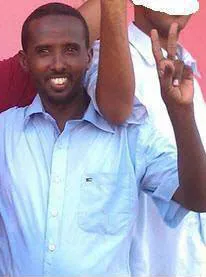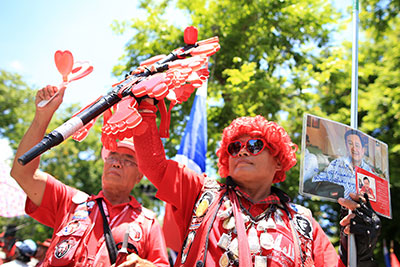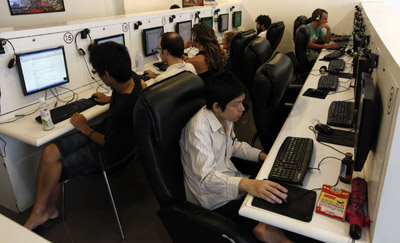CPJ welcomes acquittal of journalists charged with defamation in Thailand
Bangkok, September 1, 2015–The Committee to Protect Journalists welcomes today’s court decision in Thailand to acquit two journalists of criminal defamation and cybercrime charges. Phuketwan journalists Alan Morison, an Australian national, and Chutima Sidasathian, a Thai citizen, had each faced up to seven years in prison.

Police arrest Djibouti journalist covering demonstration
Nairobi, August 12, 2014–The Committee to Protect Journalists calls for the release of Mohamed Ibrahim Waiss, a radio journalist who was taken into custody on Friday in a suburb of the capital, Djibouti City, and accused of incitement and publishing false news. Police arrested Mohamed, a journalist for the opposition online radio station La Voix…
Journalists charged with criminal defamation in Thailand
Bangkok, December 20, 2013–The Royal Thai Navy should immediately drop the criminal defamation charges lodged on Wednesday against two journalists in connection with a report on alleged military abuses of ethnic Rohingya people, the Committee to Protect Journalists said today.
Thai journalist harassed over Facebook postings
Bangkok, August 9, 2013–A Thai journalist has been harassed and questioned today in connection with comments he posted to his personal Facebook page in early August that speculated about a possible military coup, according to news reports. The Committee to Protect Journalists calls on Thai authorities to drop the criminal investigation against Sermsuk Kasitpradit and to refrain…

Small attack on Thai newspaper has large implications
To head off rising tensions between supporters of Prime Minister Yingluck Shinawatra and cartoonist Somchai Katanyutanan, who faces possible criminal defamation charges for critical comments he posted on his personal Facebook page, Thailand’s government has to make sure police fully investigate this weekend’s attack on Thai Rath, the country’s largest circulation daily newspaper. The government’s…
Computer crime laws belie Thai claim to modern society
At online discussion sites all over the world, comments are posted on the Web as soon as they are written. People argue, inform, express anger, and voice fears. Some say things in the heat of the moment that they might go on to regret. Others are elliptical and obscure. The enabling of such conversations is…
Verdict postponed in landmark Thai Internet freedom case
Earlier today, press and human rights groups from around the world heard that the decision in the case of Chiranuch “Jiew” Premchaiporn, the manager of Thai online news site Prachatai, was being delayed yet another month. Chiranuch is charged under Thailand’s Computer Crime Act for 10 counts of not deleting apparently anti-monarchy comments on Prachatai’s…
Holding intermediaries liable for users’ content
Earlier this month, I spoke as an expert witness in the ongoing trial of Chiranuch Premchaiporn, the editor of Thailand’s Prachatai.com website, who is being criminally prosecuted under that country’s Computer Crime Act and Lesé Majesté laws. The crime involves online posts allegedly disrespectful to Thailand’s monarchy, but Chiranuch herself is not accused of originating…

Internet freedom on trial in Thailand
Hearings commenced today in the trial of Chiranuch Premchaiporn, executive director of the Thailand-based independent news website Prachatai. She stands accused of 10 different violations of the country’s draconian 2007 Computer Crime Act (CCA), each of which carries a maximum penalty of five years in prison.